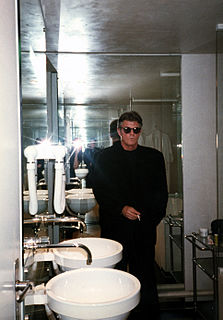Top 11 Quotes & Sayings by Lewis Baltz
Explore popular quotes and sayings by an artist Lewis Baltz.
Last updated on December 20, 2024.
I was living in Monterey, a place where the classic photographers - the Westons, Wynn Bullock and Ansel Adams - came for a privileged view of nature. But my daily life very rarely took me to Point Lobos or Yosemite; it took me to shopping centers, and gas stations and all the other unhealthy growth that flourished beside the highway. It was a landscape that no one else had much interest in looking at. Other than me.
I never had any ambition to do anything commercial, anything journalistic. I wanted to be an artist, and I wanted to be an artist whose work was done in the medium of photography. It may be debatable to this day whether I ever succeeded in achieving that ambition, but the point is, I never had any uncertainty about that.
Digital technology, you see, is not the villain here. It simply offers another dimension. I'm not sure if it's a farther remove from reality than analogue. I think if we can speak of reality, if reality and representation can be spoken of in the same sentence, if reality even exists any more, digital is simply another way of encoding that reality.
























